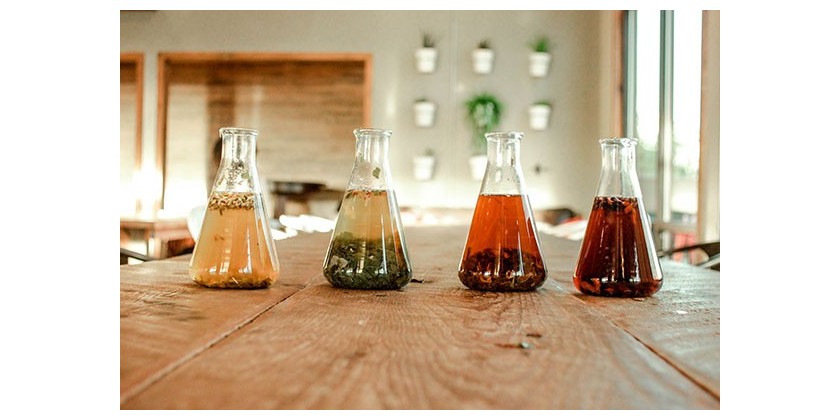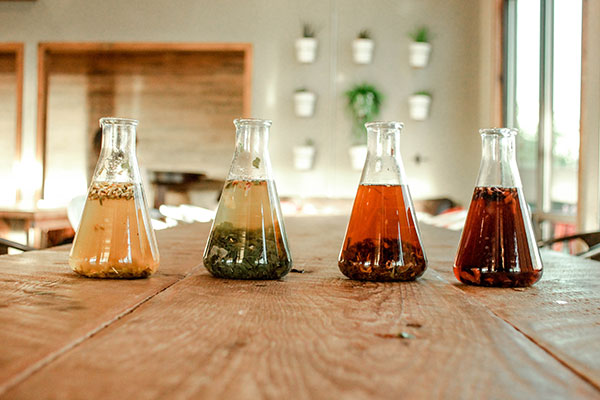
A few decades ago, tea was still an exotic drink.
Today, in 2022, incredible amounts of knowledge are available. Scientists are working hard to research potential tea benefits. Tea producers are offering insights about production. And tea experts are sharing the best brewing methods to make every tea shine.
Maybe you started drinking tea out of curiosity, and maybe you wanted to enjoy its benefits. Whichever your reason for drinking tea is, with every cup and every day, you are learning more about tea.
It’s time to bust some tea myths too.
Tea Myth 1: Tea can make you lose 10 kg in one month
Unless the blend contains strong laxatives, no real tea will help you lose 10 kg in one month. If they do, they are not healthy at all and it’s best to avoid them. While clinical studies support the use of tea in weight management [1], more research is needed to offer proper advice.
So how can tea help you lose weight? Choose teas you enjoy the most and drink them without sweeteners – possibly with high levels of EGCG. If you love soda or sweet tea, replace it with cold-brewed or unsweetened iced tea. And exercise regularly.
Tea Myth 2: Tea is the healthiest drink in the world
Tea may be the healthiest drink in the world, but there are thousands of tea types out there. Think of tea as people – every person is different, and so if every tea. Some may have more catechins, some may contain more chlorophyll, some may be abundant in L-theanine. And some may even contain pesticides, chemicals and additives.
Btw, check out the article on introverted vs extroverted tea – because each tea has a personality too!

Tea Myth 3: Tea can cure cancer
Tea – or better to say – some tea compounds, may help prevent and cure different types of cancer [2] – at least in specific laboratory conditions. However, this may not be so straightforward and simple outside the laboratory. Including tea into your daily rituals may improve your wellbeing, but any kind of self-treatment is strongly discouraged. Read more here.
Tea Myth 4: Green tea is the healthiest type of tea
Who hasn’t heard about the miracle catechin EGCG? Although there is a lot of research around EGCG in green tea and its benefits [3], there’s still a long way to go. EGCG is the most abundant in Camellia sinensis tea plant, especially in green and white tea. But all teas contain polyphenols that may provide a wide range of benefits, too.
As we already know that every tea is different, it’s quite impossible to say which will be the healthiest. So how to choose the one with most polyphenols? Instead of drinking only one type, opt for 2-3.
Tea Myth 5: All teas are healthy
All teas have a potential to be healthy, but not all of them are. Some may contain pesticides, chemicals, heavy metals, clay, and everything else that should not be in your tea. To minimize the risk, buy your tea from specialized tea shops, choose organic where possible, and opt for loose leaf tea. Want to know more about adulterated tea? Read here.
Tea Myth 6: All green/black teas taste the same
Once upon a time, only a few tea types were widely available. A couple of green teas, several types of black tea, and an occasional flavored type. Most of them – indeed – tasted the same. But today, we can try a different Sencha every day, and still be surprised how versatile its flavor can be.
Tea Myth 7: Supplementing with tea catechins is same as drinking tea
If you want to enjoy the benefits of green tea but don’t like to actually drink it, try a different brewing method. Supplementing with EGCG may be more dangerous than you think. In low quantities, EGCG may do wonders for your wellbeing, but in large quantities it may become toxic [4]. Some supplements may contain very high concentrations of this catechin. However, tea overdose by drinking tea only is more unlikely.
Tea Myth 8: Black tea contains the most caffeine
White tea contains the least caffeine, green tea contains a bit more, and black tea contains the most. If you are sensitive to caffeine, drinking white tea in the evening is something you should avoid. As it turns out, white tea is not so gentle at all. In fact, it can contain more caffeine than black tea [5].
Read more about caffeine content in different types of tea.
Tea Myth 9: You shouldn’t drink tea if you are sensitive to caffeine
You shouldn’t drink tea HIGH IN CAFFEINE if you are sensitive to caffeine. There are many amazing teas that contain very little caffeine. For example, roasted hojicha and twig tea kukicha may contain lower amounts of caffeine than other green teas. Alternatively, choose decaf teas or herbal teas. In fact, green rooibos herbal tea is as amazing as real green tea – but with no bitterness and no caffeine at all.
Interesting fact: Chocolate contains caffeine too, but we rarely think of caffeine insensitivity while eating it. In fact, 2 oz of dark chocolate may contain 60 mg [6] of caffeine - much more than a cup of black tea.
What tea myth do you keep hearing/reading the most? We’d love to hear in the comments below.
Sources:
[1] https://www.nature.com/articles/ejcn2014143
[2] https://www.nature.com/articles/d41586-019-00397-2
[3] https://www.ncbi.nlm.nih.gov/pmc/articles/PMC6412948/
[4] https://www.ncbi.nlm.nih.gov/pmc/articles/PMC2905152/
[5] https://www.ncbi.nlm.nih.gov/pmc/articles/PMC4787341/
[6] https://www.hsph.harvard.edu/nutritionsource/food-features/dark-chocolate/



Leave a Reply Cancel Reply